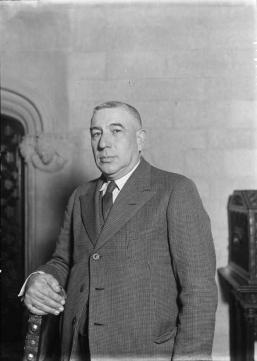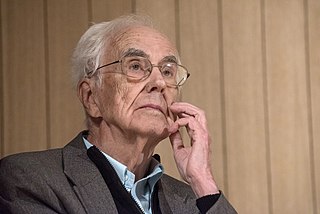
The Catalan Countries are those territories where the Catalan language is spoken. They include the Spanish regions of Catalonia, the Balearic Islands, Valencian Community, and parts of Aragon and Murcia (Carche), as well as the Principality of Andorra, the department of Pyrénées-Orientales in France, and the city of Alghero in Sardinia (Italy). It is often used as a sociolinguistic term to describe the cultural-linguistic area where Catalan is spoken. In the context of Catalan nationalism, the term is sometimes used in a more restricted way to refer to just Catalonia, Valencia and the Balearic Islands. The Catalan Countries do not correspond to any present or past political or administrative unit, though most of the area belonged to the Crown of Aragon in the Middle Ages. Parts of Valencia (Spanish) and Catalonia (Occitan) are not Catalan-speaking.

Josep Irla i Bosch was a Catalan businessman and politician. He was a deputy in the Parliament of Catalonia and the Spanish Congress in 1932, as an Esquerra Republicana de Catalunya affiliate. He was also the last President of Parliament of Catalonia at the end of Republican Catalan resistance in the Spanish Civil War, before Francisco Franco abolished the Generalitat of Catalonia. He was elected President of the Parliament of Catalonia on 1 October 1938. In office, Irla pushed for cooperation with the allies, Basque nationalists and other anti-Francoist groups, though excluding the communists. He became the President-in-exile of the Generalitat after Lluís Companys was executed. During his time as President-in-exile, he established a Government in exile, and appointed Josep Tarradellas as Conseller en Cap. He resigned as President in 1954.

Josep Bargalló i Valls is a Spanish teacher and politician from Catalonia and the current Minister of Education of Catalonia.

Josep Piqué Camps was a Spanish politician of the conservative People's Party (PP). He served in ministerial departments under the José María Aznar government. He also helmed the People's Party of Catalonia from 2003 to 2007.

VilaWeb is a Catalan-language web portal and daily news outlet, founded in May 1995 by the journalists Vicent Partal and Assumpció Maresma. It was the first online medium produced completely in Catalan, and the first news media in Spain to be based entirely online. Its editorial line advocates for Catalonia's separation from the Spanish state.

Josep Maria Benet i Jornet, also known as "Papitu", was one of the most renowned Catalan playwrights, considered one of the main renewers of Catalan theater.

Josep Maria Espinàs i Massip was a Catalan writer, journalist and publisher known for his novels, travel writing and newspaper articles.

L'Esquirol, known as Santa Maria de Corcó until 4 June 2014, is a municipality in the comarca of Osona in Catalonia, Spain.

Los Sírex is a Spanish rock band founded in 1959 in Barcelona and active until 1972. In 1977 they got together again and were active until 2012. It was initially formed by three members: Guillermo Rodríguez Holgado, Antonio Miers and Manuel Madruga (Manolo), then briefly joined by the vocalist Santi Carulla in 1960. By the end of 1960, the band consisted of Antoni Miquel Cerveró as lead vocalist, Lluís Gomis on the drums, Josep Fontseré Portolés on the rhythm guitar, Guillermo Rodríguez Holgado on the bass and Manolo Madruga on the lead guitar. They named the band after a component of eyeglasses: Guillermo worked at his father's glasses factory, where they used a filament called Sírex to adjust the lenses to the frames of the glasses. They became identified with a pure rock and roll style with daring lyrics that caused them trouble with the Spanish censorship of the time. They sang in Spanish.

The Catalan language originated from Vulgar Latin in the Pyrenees Mountains between France and Spain. It diverged from the other Romance languages in the 9th century. At that time, Catalan spread quickly throughout the Iberian peninsula when the Catalan counts conquered Muslim territory. By the 11th century, the Catalan language was present in several feudal documents. Catalan was present throughout the Mediterranean by the 15th century. At that time, the city of Valencia was thriving.

The Assemblea Nacional Catalana is an organization that seeks the political independence of Catalonia from Spain. It also promotes the independence of other Catalan-speaking regions, which are collectively known as the Catalan Countries.

The Concert for Freedom was a concert held at Camp Nou football stadium in Barcelona on 29 June 2013, organized by Òmnium Cultural in conjunction with other civil society organization such as the Assemblea Nacional Catalana and the Plataforma Pro Seleccions Esportives Catalanes with the goal using the universal language of music to demand the right of Catalonia and other nations of the world to freely and democratically decide their future. Some 90,000 people were in attendance. Between the 2012 Catalan independence demonstration and the Catalan Way, the concert was another social mobilization event in favor of independence. More than 400 artists performed, among them Lluís Llach, Sopa de Cabra, Miquel Gil, Pastora, Joana Serrat, Jofre Bardagí, Jordi Batiste, Lídia Pujol, Maria del Mar Bonet, Marina Rossell, Mercedes Peón, Nena Venetsanou, Orfeó Català, Paco Ibáñez, Pascal Comelade, Pau Alabajos, Pep Sala, Peret, Projecte Mut, Sabor de Gràcia, Ferran Piqué, Joan Enric Barceló & Eduard Costa from Els Amics de les Arts, and Brams. The artistic directors were Gerard Quintana and Lluís Danés, who was in charge of set design. The stage featured various steps symbolizing the path toward freedom.
Marrecs de Salt is a group of castellers from Salt, Girona (Catalonia), founded in 1995. They are also to be considered as the local group in Girona, together with their university counterpart: Xoriguers de la UdG. They are one of the seven active groups in the province of Girona, and since the dissolution of Castellers de l'Albera, also the oldest. Their best human tower is the 5 in 8 and their best performance was on 27 October 2013 for the performance of Sant Narcís in the city of Girona, were they completed the 4 in 8, the 2 in 8 with double base, the 3 in 8 and the pillar of 6. Their shirt is blue standing for the river Ter, which flows through both Salt and Girona, as well as other regions of the province.

Julià de Jòdar i Muñoz, is a Spanish writer in Catalan.

The Operation Anubis was a police operation in Catalonia, Spain, initiated on 20 September 2017 by the Civil Guard following orders of the trial court number 13 of Barcelona, directed by judge Juan Antonio Ramírez Sunyer. Its aim was to dismantle the framework of the Catalan independence referendum of 1 October 2017, that was suspended on 6 September 2017 by the Constitutional Court of Spain as breaching the 1978 Constitution. Different headquarters of the Generalitat de Catalunya were searched and 14 people were arrested, including high ranking administrative staff, and company CEO's involved in the preparation of the referendum. Simultaneously, several printing and media companies were searched looking for ballot papers and boxes. More than 140 websites were shut down by the Spanish justice and police.

Dolors Bassa i Coll is an educator, psychopedagogist and Spanish politician from Catalonia who held the position of Minister of Labour, Social Affairs and Families in the Generalitat de Catalunya until Spain dismissed the Catalan government on 27 October 2017. She is known for her syndicalist career in the major Spanish trade union, Unión General de Trabajadores. Since March 2018 she was remanded in custody, without bail, by order of the Supreme Court of Spain, accused of sedition and rebellion. She was sentenced on October 14, 2019, to 12 years in prison for sedition, as being responsible for devoting several thousand public schools as polling stations in the 1 October 2017 referendum. She was freed in June 2021 following a government pardon.

Francoism in Catalonia was established within Francoist Spain between 1939 and 1975, following the Spanish Civil War and post-war Francoist repression. Francisco Franco's regime replaced Revolutionary Catalonia after the Catalonia Offensive at the end of the war. The dictatorship in Catalonia complemented the suppression of democratic freedoms with the repression of Catalan culture. Its totalitarian character and its unifying objectives meant the imposition of a single culture and a single language, Castillian. The regime was specifically anti-Catalan, but this did not stop the development of a Catalan Francoism that was forged during the war and fed by victory.

Eulàlia Reguant i Cura is a Spanish politician. From 2015 to 2017 she represented the constituency of Barcelona in the Parliament of Catalonia, where she was a member of the Popular Unity Candidacy (CUP). From 2017 to 2019 she was a councilor in the City Council of Barcelona.

Mantinc el català is a linguistic, non-profit citizen platform distributed in various parts of the so-called Catalan Countries, where Catalan is an autochthonous language. Its volunteering aims to encourage the language revitalization in the public sphere by persuading, as many Catalan speakers as possible, to refrain from unconsciously shifting their language to (mostly) Spanish in routine situations such as in the street, commerce, public services or with the immigrants. Its organizational motto is Mantinc el català sempre, a tot arreu i amb tothom! ”.

Maria Carme Junyent i Figueras, commonly known as Carme Junyent, was a Catalan linguist. Renowned in her work field, in particular for her defense of the Catalan language and studies on endangered languages, she was a professor of linguistics at the University of Barcelona. She specialized in African languages and sociolinguistics.


















